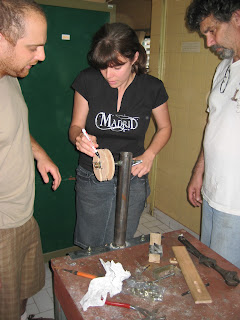Fortunately, Sandra doesn’t have a lot of difficulties as the head account because as she says, she’s “been a bE accountant since the beginning, and know[s] how bE works.” However, she favored switching to the accounting program more suitable for conditions in Nicaragua that has empowered the sustainability of the local administration staff. Although blueEnergy acquired an accounting system in between Sandra’s arrival and now, it was in English and all technical support was through the US. This new program has a manual in Spanish and technical support in Managua, making it easier for internal education and problem solving.
Native to Bluefields, Sandra not only works for blueEnergy, she also attends BICU university as a full-time student. This year, she completes her third of a four-year civil engineering program, which she attends three nights during the week. Next year, she begins a five-year business administration program on Saturdays. These classes will help her “understand things like contracts between blueEnergy” and other organizations. “Learning more about the technical part [also] enables me to better understand the administrative part which is largely based around the finances of technical projects,” Sandra says. She also hopes to use her technical knowledge to work with blueEnergy’s energy or water teams in the future.
Sandra enjoys accounting, everything that has to do with analysis, finances, how to improve processes and economics..Her time spent in the administration office makes her work more interesting. The relations between women are good and she also benefits from the culture exchange inherent to working with international volunteers.
 |
| (L - R) Sandra with co-worder Yarlenne |
“When I started, bE wasn’t well known here in Bluefields because a majority of the work was done in remote communities in the RAAS (southern autonomous region). Everyone would ask me what bE does. Now, with all of the contracts bE has done, especially all the work in Bluefields, it’s given itself to be better known. I believe that in the future, in the next five years, bE will be a big NGO that offers services in more communities, and eventually has the capacity to do projects in the RAAN (northern autonomous region) as well.”








